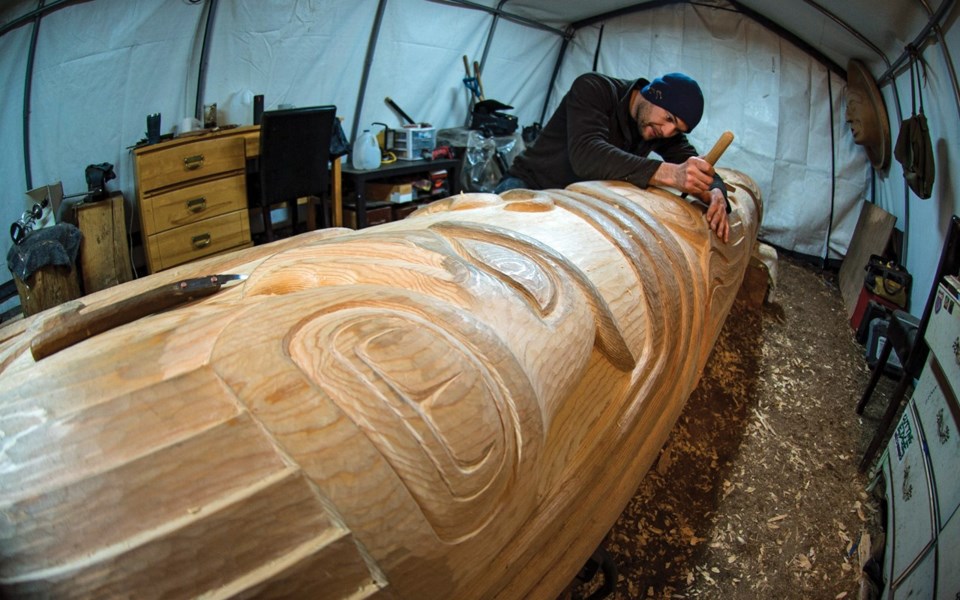Ryan Scoular stomps through the snow and zips the tent closed behind us, against the winter chill. We're suddenly enveloped by the scent of cedar and wood smoke. The boot-trodden ground is flecked with curls and chips of wood. Rain bounces off the heavy-duty plastic canopy overhead. Tools line the walls — a neat collection of snow shovels, a well-used chainsaw, axes tucked under a chest of drawers, and on top of the chest, laid out with a surgical precision, a dozen hand-tools — chisels, adzes, blades laid carefully beside a journal and a chunk of purple crystal. In the corner, a woodstove churns out a steady heat.
The totem pole is six metres long, a semi-circle of red cedar, with the back hollowed away, and it lies propped on a series of steady wood blocks. Scoular moves with a long, lean grace through the space. His fingerprints, his blade marks, his chiselling, his vision, are all over the piece. He sits on the huge slumbering pole as we chat, and he talks up its length, pointing out the storyline he's weaved across it, the eagles, the elements of nature from the sea to the sky, the spirit world.
Later, as he progresses with the piece, he'll take to covering the completed sections of the pole with heavy blankets, an attempt to keep Cashew the cat from trailing his muddy pawprints up and down its length.
Under another blanket on the ground behind the stove, three tiny frogs have taken up residence. Their winter songs wiggled into Scoular's subconscious and insisted on becoming part of the pole's design — one carved frog, amongst a suite of eagles, attest to the steadfast companions who have accompanied him over months of cold, careful steady work.
Scoular is working every day now to complete the totem pole by his 34th birthday at the end of March. It's challenging work — physically and emotionally — to return to the giant sleeping cedar post every day, and coax it to life.
"I definitely have days when I struggle to keep going, coming out here every single day, but for the most part, it's been really fun," he says. "Carving is a very intimate thing. The wood has a language of its own, and when you're creating, there's a suspension of time. Everything falls away and you go to a different place. That's the beauty of making art. The whole spectrum of emotions have happened in this tent — friends have come over, there's been a lot of happiness, people have cried, cut themselves, everything! And the pole soaks everything up. For me, it's just a silent witness of life through nine months of time."
Scoular grew up in Port Alberni, on Vancouver Island. He learned to carve under the guidance of his father, and Sechelt Nation carver, Derald Scoular, in the Kwakwaka'wakw style, as soon as he was big enough to hold a knife. At 20, he trained to become a heavy-duty mechanic, and spent the next 13 years working in various trades — always coming back to his true passion of carving when he had the chance.
He moved to Pemberton in the fall of 2016 — serendipity and his brother's connections there landed him in James Funk's suite. Funk builds custom residences in Whistler and his client happened to be looking to source a carver just after Scoular moved in.
Scoular's father carved to support his family, and would enlist his sons to help. "For him, it was almost production art. He had to make pieces to sell them."
I feel an unfairness in the story, an age-old one: Since first contact, the art of the First Nations people was revered, was bought, stolen, confiscated, displayed, taken away — and yet the people themselves were not honoured.
Out of that dark historic tangle, Scoular emerges, like many artists of his generation — disconnected from their culture, witness to the way systemic abuse damaged or destroyed family members, reclaiming and reinterpreting identity, and offering it back to the world on their own terms.
"I did get bits and pieces of the culture growing up, but it wasn't as strong as I would have liked it to be," say Scoular. "So I kind of have had to set out on my own and find my own information. You can attribute a lot to the carvers and the natives who went underground when everything was banned and continued these traditions and carvings and stories. I'm really proud to be a part of this rising up again of native culture, to put this stuff out there and bring awareness to it in whatever way I can. It's important and it feels good to be a part of."
A reclamation and an exquisite totem pole are being birthed in this humble tent. And alongside it, Ryan Scoular's bright career.
The Velocity Project: how to slow the f*&k down and still achieve optimum productivity and life happiness.




